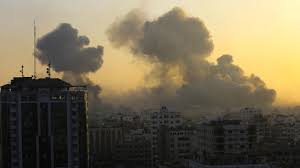Understanding the Gaza Conflict and its Humanitarian Impact

Introduction
The Gaza conflict has once again captured global attention as tensions escalate dramatically, resulting in severe humanitarian concerns. With a history rife with territorial disputes and violent confrontations, the importance of understanding the intricacies of this conflict cannot be overstated. In recent months, the situation in Gaza has deteriorated, leading to widespread displacement and needs that outstrip available resources, prompting international calls for intervention and support.
Current Events and Recent Developments
As of late 2023, military operations have intensified in Gaza, with reports of significant airstrikes targeting various areas. The situation escalated after ongoing skirmishes between Palestinian factions and Israeli forces led to a surge in violence that saw civilian casualties rise alarmingly. Humanitarian organizations have stated that over 2 million citizens in Gaza are facing dire conditions, struggling to access food, clean water, and medical care. The United Nations reported that over 1.5 million residents have been displaced since the beginning of intensified fighting in October 2023.
To complicate matters, the blockade imposed by Israel has hindered the flow of essential supplies into the region, leading to critical shortages. Aid organizations are warning that without immediate assistance, the situation could reach catastrophic proportions, prompting global leaders to emphasize the need for immediate humanitarian corridors to facilitate aid delivery.
International Reactions
The international community remains divided over the conflict, with various nations calling for ceasefires and peace talks. The United States has reiterated its support for Israel’s right to defend itself while also acknowledging the necessity of safeguarding civilian lives. Meanwhile, other countries, particularly in the Arab world, have expressed solidarity with the Palestinian people, demanding an end to military actions and a comprehensive approach to resolving the underlying issues.
Conclusion
The implications of the ongoing Gaza conflict extend far beyond the immediate loss of life and property. The cycle of violence and retaliatory attacks not only impacts the local populace but also sends shockwaves through regional politics and international relations. As we progress toward the end of 2023, it remains crucial for both regional powers and global leaders to advocate for peace, emphasizing dialogue over aggression. Without significant investment in humanitarian efforts and a renewed push for diplomatic solutions, it is likely that Gaza will remain a flashpoint of conflict with devastating consequences for generations to come.









